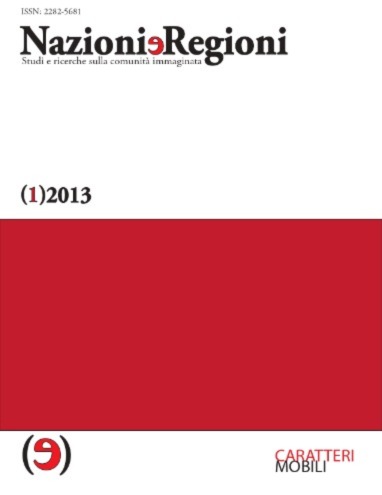Quando il passato si tinge di rosso: la socializzazione della storia nazionale e la nazionalizzazione delle lotte sociali in Bretagna e Galizia negli anni ’70
DOI:
https://doi.org/10.15162/2282-5681/1646Parole chiave:
Bretagna, Galizia, nazionalismo, storiografia, lotta per l’egemonia, Brittany, Galicia, nationalism, historiography, struggle for hegemonyAbstract
Le rappresentazioni del passato sono parte della lotta per l’egemonia nella rappresentazione dei territori nazionali e regionali. Prendendo come esempi i casi della Bretagna (Francia) e della Galizia (Spagna), questo articolo mostra come queste rappresentazioni dipendano dalla definizione che un gruppo sociale fornisce di un territorio o di una nazione, e come siano quindi soggette a cambiamenti. Infatti quando i movimenti nazionalisti in Bretagna e Galizia passarono da una definizione etnica del loro paese ad una marxista, essi fissarono un intero nuovo repertorio di riferimenti storici utilizzabili nella loro lotta politica. Questo nuovo repertorio contribuì a cambiare l’immagine di entrambe le regioni.
Representations of the past are part of the struggle for the hegemonic representation of regional and national territories. Taking as examples the cases of Brittany (France) and Galicia (Spain) this article shows that these representations depend on the definition a social group has of a territory or a nation, and can therefore change. In fact, when the nationalist movements in Brittany and Galicia shifted from an ethnic definition of their country to a Marxist one, they established a whole new repertoire of historical references to be usable in their political struggle. This new repertoire contributed to change the image of both regions.
Riferimenti bibliografici
Álvarez S. (1977), ¿Que es el PCG?, Akal, Madrid.
Álvarez S. (1980), Galicia nacionalidad histórica. Causas de su marginación. Su perspectiva, Editorial Ayuso, Madrid.
Barros C. (1994), «Mitos da historiografía galeguista», Manuscrits. Revista d’história moderna, n. 12, pp. 245-266.
Barros C. (1995), «Ascenso e caída do mariscal Pardo de Cela», in Losada Diéguez A., 10 anos dun premio, Concello de Carballiño, Poio, pp. 85-89.
Beramendi J. G., Nuñes Seixas X. M. (1996), O nacionalismo Galego, A nosa terra, Vigo.
Bertho C. (1980), «L’invention de la Bretagne. Genèse sociale d’un stéréotype», Actes de la recherche en sciences sociales, n. 35, pp. 45-62.
Billig M. (1995), Banal nationalism, Sage, London.
Boyd C. P. (1997), Historia Patria: Politics, History and National Identity in Spain, 1875-1975, Princeton University Press, Princeton (NJ).
Brow J. (1990), «Notes on Community, Hegemony and the Uses of the Past», Anthropological Quarterly, vol. 63, n. 1, pp. 1-6.
Chaput M. C. (2000), «La Galice à la fin du franquisme: la récupération de l’histoire dans quatre articles de Triunfo, 1973-1974», in Sánchez J.-P.(ed.), Galice-Bretagne-Amérique latine, Laboratoire Interdisciplinaire de Recherche sur les Amériques, Rennes, pp. 95-
Citron S. (1989), Le mythe national. L’histoire de France en question, Les éditions ouvrières, Paris.
Coakley J. (2004), «Mobilizing the Past: Nationalist Images of History», Nationalism and Ethnic politics, Vol. 10, pp. 531-560.
Croix A. (2002), «La révolte des Bonnets rouges. De l’histoire à la mémoire», Armen, n. 131, pp. 2-11.
Denis M. (2001), «Arthur de La Borderie (1827-1901) ou ‘l’histoire, science patriotique’», inTonnerre N.-Y. (ed.), Chroniqueurs et historiens de la Bretagne du Moyen-Âge au milieu du XXe siècle, PUR/ICB, Rennes, pp. 143-155.
ESB – de la Borderie A. – Porchnev B. (1975), Les Bonnets Rouges, Éditions 10/18, Paris.
Fournis Y., Kernalegenn T. (2005), «Des historiens au service d’une nation inachevée : La Bretagne», Wetenschappelijke Tijdingen, n. 64, pp. 153-191.
Gómez Alén J. (1995), As CC.OO. de Galicia e a conflictividade laboral durante o franquismo, Xerais, Vigo.
Guillorel H. (1981), «Problème breton et mouvement breton», Pouvoirs, n. 19, pp. 83-102.
Hall P. (1997), «Nationalism and Historicity», Nations and nationalism, vol. 3, n. 1, pp. 3-23.
Hearn J. (2002), «Narrative, Agency, and Mood: on the Social Construction of National History in Scotland», Comparative Studies in Society and History, vol. 44, n. 4, pp. 745-769.
Hobsbawm E. J. (1983), «Come si inventa una tradizione» in Hobsbawm E. J. & Ranger T. (a cura di) L’invenzione della tradizione, trad. it. di E. Basaglia, Einaudi, Torino, pp. 3-17.
Keating M. (1988), State and Regional Nationalism. Territorial Politics and the European State, Harvester-Wheatsheaf, New York / London.
Keating M. (1996), Nations against the State. The New Politics of Nationalism in Quebec, Catalonia and Scotland, MacMillan Press Ltd, London.
Keating M. (1998), The new Regionalism in Western Europe: Territorial Restructuring and Political Change, Edward Elgar Publishing Ltd, Cheltenham (UK).
Keating M. (2001), «How Historic are Historic Rights? Competing Historiographies and the Search for Political Legitimacy», Simposio de Antropoloxía “Etnicidade e Nacionalismo”, Consello da Cultura Galega, Santiago de Compostela, pp. 45-81.
Kernalegenn T. (2005), Drapeaux rouges et gwenn-ha-du. L’extrême gauche et la Bretagne dans les années 1970, Apogée, Rennes.
Le Dantec J.-P. (1974), Bretagne: re-naissance d’un peuple, Gallimard, Paris.
Máiz R. (1992), «Poesia del pasado y comunidad imaginaria: los usos politicos de la historia en el discurso del nacionalismo gallego», in Ibarra P., Ideologia y nacionalismo, Instituto de Estudios sobre Nacionalismos Comparados, Vitoria, pp. 53-74.
Máiz R. (1997), A idea de nación, Xerais, Vigo.
McCrone D. (1998), The Sociology of Nationalism, Routledge, London and New York.
Nicolas M. (1986), Le séparatisme en Bretagne, Éditions Beltan, Brasparts.
Nuñez Seixas X. M. (2001), «De Breogán a Pardo de Cela, pasando por América: notas sobre la imaginación del nacionalismo gallego», Historia Social, n. 40, pp. 53-78.
Porhel V. (2003), «Usage politique de l’histoire par le régionalisme breton dans les conflits sociaux des années 68», Contribution to the conference on Les usages politiques de l’Histoire dans la France contemporaine des années 70 à nos jours, Paris.
Porhel V. (2008), Ouvriers bretons. Conflits d’usines, conflits identitaires en Bretagne dans les années 1968, Presses Universitaires de Rennes, Rennes.
Somers M. (1994), «The Narrative Constitution of Identity: a Relational and Network Approach», Theory and Society, vol. 23, n. 5, pp. 605-649.
Rubiralta Casas F. (1998), De Castelao a Mao. O novo nacionalismo radical galego (1959-1974): orixes, configuración e desenvolvemento inicial da UPG, Laiovento, Santiago de Compostela.
Smith A. D. (1999), Myths and Memories of the Nation, Oxford University Press, Oxford.
Swidler A. (1986), «Culture in Action: Symbols and Strategies», American Sociological Review, vol. 51, n. 2, pp. 273-286.
Thiesse A.-M. (1999), La création des identités nationales, Europe XVIII-XX siècle, Seuil, Paris.
Tilly C. (1986), La France conteste de 1600 à nos jours, Fayard, Paris.
Downloads
Pubblicato
Fascicolo
Sezione
Licenza
Nazioni e regioni è una rivista open access che applica la licenza Creative Commons CC BY-NC-ND 4.0 a tutti i contenuti pubblicati.
Nazioni e regioni is an open-access journal that applies the Creative Commons CC BY-NC-ND 4.0 licence to all published contents.







